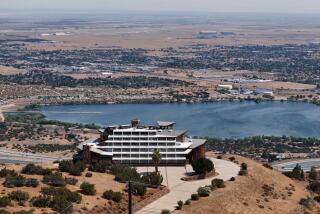Elks Clubs Join Stampede to Cash in on Land Prices
- Share via
Around the Los Angeles area, the Elks are migrating.
Property that the fraternal organization owns in Pasadena and Long Beach is for sale, and a developer said Tuesday that it had bought the Huntington Beach Elks lodge.
The reason: Land in Southern California is fetching such high prices that clubs that have been around a few years find themselves sitting on gold mines.
The Huntington Beach Elks, for instance, got about $5 million for four acres next to the San Diego Freeway. That’s enough money to burn the mortgage on the old place, build a nicer clubhouse and still have a tidy balance in the bank.
When the Elks bought the lodge in 1971, owning 700 feet along the San Diego Freeway in North Orange County was not that big a deal. Now, it’s a hot location for an office building or retail stores, says the new owner, Newport Beach developer Burnham USA Equities. Burnham says it will tear down the old lodge.
Meanwhile, about three miles down Talbert Avenue in Huntington Beach, construction on the new lodge starts next month.
In Pasadena, the Elks are asking about $11 million for a three-acre parking lot where TV crews set up shop each year to shoot the Rose Parade. The prospective buyer wants to build a hotel, and the Elks want the money to spruce up their lodge, which opened in 1911.
There’s a good reason why the Elks want spiffier clubhouses: Most Southern California lodges are losing members at a time when it’s a lot hipper to do your own thing than to be a joiner. A nicer clubhouse, the Elks reason, might bring some of those people back.
The Elks haven’t helped recruiting much by barring women and, in some cases, blacks from their lodges. More than 120 years old, the Benevolent and Protective Order of Elks didn’t permit blacks to join until 1973, and there are still few black members.
In many ways, the Elks and clubs like them represent some of the best small-town values, like the charitable work they do, and some of the worst, like barring women from membership. In fact, small towns and suburbs are where fraternal clubs still flourish; it’s often the urban clubs such as Pasadena and Huntington Beach that face shrinking memberships.
“Elks clubs in small towns have big memberships because it’s the only thing in town,” says Bob Cooley, secretary of the Huntington Beach lodge. “In the cities, there are a lot of things competing for people’s time.”
The Pasadena lodge, for instance, had 2,000 members 10 years ago; now it has 1,400. In Long Beach 30 years ago, there were nearly 10,000 Elks; now there are 2,800. And in Huntington Beach, there were nearly a thousand Elks in the early 1980s; today, 800.
In Pasadena, the Elks have been talking for a couple of years to a developer whom they won’t identify. The talks were progressing nicely, according to the Elks, when Pasadena passed a slow-growth ordinance last year that nearly scared off the buyer. Even if he manages to evade the ordinance, which allows developers to build no more than 250,000 square feet of commercial space each year, he will face Pasadena’s tough zoning laws.
But the property may be worth the trouble. In an affluent neighborhood on Pasadena’s west side, the parking lot is at the corner of two major streets. There’s a freeway ramp nearby, as well as the Norton Simon Museum and rows of upscale condos and apartments along the tree-lined streets.
The Rose Parade makes a turn here from Orange Grove Boulevard onto Colorado Boulevard, and the corner is familiar to millions of television viewers. It’s time, say the Elks, to cash in on the real estate.
“Fraternal organizations are losing membership,” said Bob Howard, who oversees the lodge’s full-service kitchen and bar as general manager. “We need a new building if we’re going to do something about that.”
But to other clubs, the trend seems inevitable. The new Huntington Beach lodge, for instance, will be only about three-quarters the size of the old one.
And the Long Beach club, in a bustling industrial neighborhood near the city’s airport, is selling the 2.5 acres under its lodge for $4 million. It has already sold five acres where a hotel now sits.
The club will use the money to build a new lodge nearby.
And it will be less than half the size of the old one.
More to Read
Sign up for Essential California
The most important California stories and recommendations in your inbox every morning.
You may occasionally receive promotional content from the Los Angeles Times.










